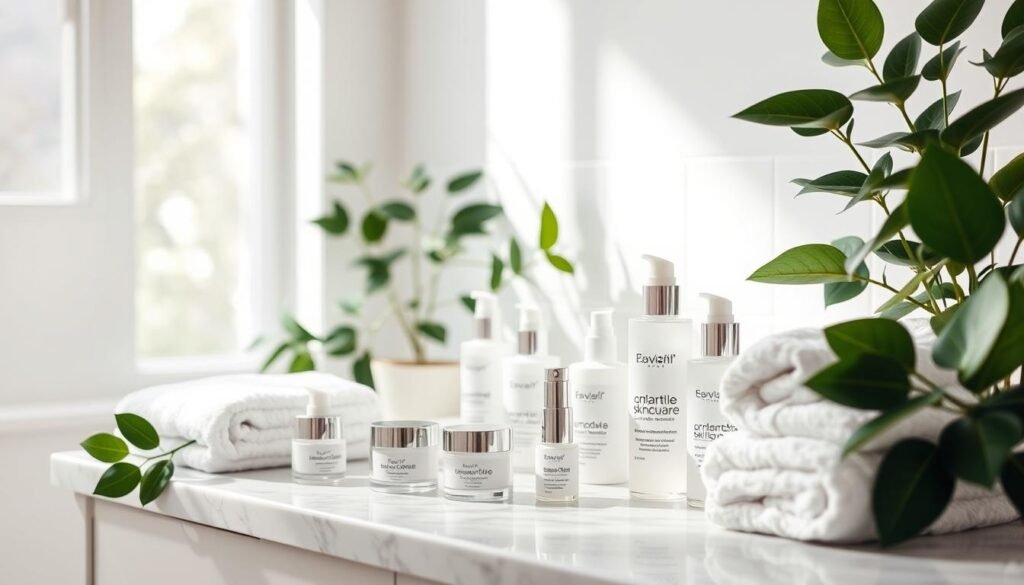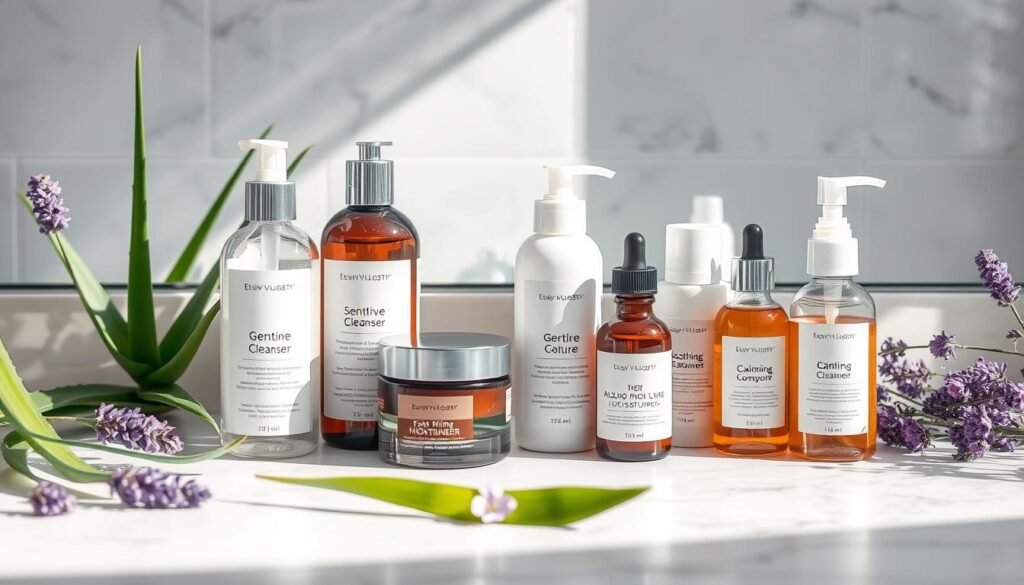For those with Sensitive Skin Care Tips, finding the right skin care routine can be tough. But, it’s possible to get a glowing complexion with the right approach. The key is to use gentle products and avoid things that might irritate your skin.
Key Takeaways
- Understand the causes and symptoms of sensitive skin to tailor your skin care routine.
- Incorporate gentle, hydrating cleansers and toners to soothe and nourish sensitive skin.
- Identify and avoid irritating ingredients that can trigger skin sensitivity.
- Choose skin care products formulated specifically for sensitive skin types.
- Adopt lifestyle habits that support healthy, glowing skin, such as sun protection and stress management.
Understanding Sensitive Skin
Sensitive skin can be tough to handle, but knowing what causes it and its symptoms is key. It’s often due to things like the environment, our daily habits, or our skin’s natural makeup. Figuring out what makes your skin sensitive helps you find the right care routine.
What Causes Skin Sensitivity?
Many things can make skin sensitive, such as:
- Too much sun
- Harsh skincare products
- Smoking
- High stress
These factors can harm the skin’s protective layer. This leads to dryness, inflammation, and skin that reacts easily.
Common Symptoms of Sensitive Skin
Signs of sensitive skin include:
- Redness
- Stinging or burning
- Itching or tightness
- Easy irritation
Knowing about causes of sensitive skin and sensitive skin symptoms helps in identifying sensitive skin. This knowledge lets you take steps to protect and calm your skin.
“Healthy, resilient skin is the foundation for a radiant complexion. By addressing the root causes of sensitivity, you can unlock your skin’s full potential.”
Sensitive Skin Care Routine

Caring for sensitive skin means being gentle and avoiding harsh products. Using the right cleansers and toners helps keep your skin healthy and glowing. This way, you avoid sensitivity or irritation.
Gentle Cleansing
Stay away from harsh soaps and choose mild, fragrance-free cleansers instead. These products should not strip your skin of its natural oils. Look for sensitive skin care routine items with soothing ingredients like chamomile, aloe vera, or ceramides. They help cleanse your face without making it red or dry.
Hydrating Toners
After washing, use a hydrating toner to bring back moisture and calm irritation. Pick toners without alcohol but full of gentle cleansers like rose water, glycerin, or green tea. These ingredients soothe and refresh your skin gently.
| Ingredient | Benefits for Sensitive Skin |
|---|---|
| Aloe Vera | Soothing and anti-inflammatory properties to reduce redness and irritation |
| Glycerin | Deeply hydrates and traps moisture in the skin |
| Ceramides | Strengthen the skin’s protective barrier to prevent moisture loss |
Focus on a sensitive skin care routine with gentle cleansers and hydrating toners. This approach meets the special needs of sensitive skin. It helps keep your skin healthy and glowing.
Sensitive Skin Care Tips

Caring for sensitive skin means being gentle and strategic. It’s not just about cleaning and hydrating. There are more tips to keep your skin healthy and glowing.
First, always use broad-spectrum sunscreen daily. UV rays can really irritate sensitive skin, causing redness and damage. Choose a sunscreen with physical blockers like zinc oxide or titanium dioxide. They are gentler on sensitive skin.
Second, avoid harsh exfoliation. Even though exfoliating is key for all skin, sensitive skin needs care. Instead of rough scrubs, use gentle chemical exfoliants. Ingredients like lactic acid or glycolic acid help remove dead skin without harm.
- Use ingredients like ceramides, niacinamide, and vitamin E to help your skin’s barrier.
- Keep stress low, as stress can make skin sensitivity worse and cause breakouts.
By following these sensitive skin care tips, you can protect and calm your sensitive skin. This will help you show off a healthy, glowing complexion.
Choosing Right Products

For sensitive skin, picking the right skincare products is key. Avoid harsh ingredients that can make your skin worse. Instead, go for gentle products that help and protect your skin.
Ingredients to Avoid
- Alcohol
- Fragrances
- Dyes
- Harsh sulfates
These ingredients can dry out your skin, making it red and irritated. By skipping them, you keep your sensitive skin healthy and glowing.
Ingredients to Look For
- Ceramides
- Vitamin E
- Aloe vera
- Hyaluronic acid
These ingredients are soothing and hydrating. They help your skin’s barrier, keep moisture in, and reduce redness. Adding these sensitive skin care products to your routine can greatly improve your skin’s health and look.
| Ingredient | Benefit for Sensitive Skin |
|---|---|
| Ceramides | Helps to restore and strengthen the skin’s natural barrier |
| Vitamin E | Provides antioxidant protection and soothes irritation |
| Aloe vera | Calms inflammation and promotes healing |
| Hyaluronic acid | Deeply hydrates and plumps the skin |
Using these ingredients for sensitive skin in your routine nourishes and protects your skin. This ensures a healthy, glowing look.
“The key to caring for sensitive skin is to be mindful of the ingredients in your products and choose formulas that are gentle, soothing, and hydrating.”
Lifestyle Habits for Sensitive Skin

Healthy skin is more than just about skincare routines. For those with sensitive skin, certain lifestyle habits can greatly help. These habits can improve skin sensitivity and make your skin look young and bright.
It’s important to avoid things that can irritate your skin, like pollution, harsh weather, and too much sun. Drinking lots of water is also key to keeping your skin calm and healthy.
- Avoid activities that can further irritate sensitive skin, such as harsh scrubbing or taking long, hot showers.
- Incorporate relaxation techniques like meditation or gentle yoga into your routine to manage stress, as high-stress levels can exacerbate skin sensitivity.
By making these lifestyle changes and using a good skincare routine, people with sensitive skin can have healthy, glowing skin. This helps them handle the challenges of sensitive skin better.
“Nurturing your skin through a combination of gentle skincare and mindful lifestyle habits is key to maintaining a healthy, radiant complexion, especially for those with sensitive skin.”
Also Read: Repair And Rejuvenate: The Ultimate Guide To Skincare For Sun Damaged Skin
Conclusion
Understanding what makes your skin sensitive and how to care for it is key. A gentle skincare routine and lifestyle changes can help. Using soft cleansers and toners, and avoiding harsh chemicals is important.
It’s also crucial to manage stress. These steps can make your skin healthy and glowing.
Creating a skincare plan that fits your needs is essential. Find out what your skin reacts to and use products that nourish it. Adopt habits that help your skin stay healthy.
This way, you can handle sensitive skin’s challenges and get a glowing, youthful look. With the right care, sensitive skin can look flawless and radiant.
The path to glowing skin is ongoing, but starting with these tips is a great step. Listen to your skin and follow a gentle skincare routine. This will help you get a naturally bright and healthy glow.
FAQs
Q: What are some effective tips for sensitive skin care?
A: Some effective tips for sensitive skin care include using products specifically designed for sensitive skin, keeping your skin hydrated, and avoiding harsh ingredients. It’s also beneficial to regularly remove dead skin cells to maintain healthy skin texture.
Q: How can I identify my skin type to choose the right skincare product?
A: To identify your skin type, observe how your skin feels throughout the day. If your skin is often dry or flaky, you likely have dry skin. If it’s shiny and oily, you have oily skin. Combination skin may exhibit both characteristics. Understanding your skin type is crucial for selecting suitable skincare tips for sensitive skin.
Q: What skincare tips should I follow if I have dry sensitive skin?
A: For dry sensitive skin, it’s important to use a gentle cleanser like Cetaphil Gentle Skin Cleanser, which is formulated for sensitive skin. Additionally, ensure to keep your skin hydrated and apply moisturizers that help protect the skin barrier.
Q: How can a dermatologist help with managing sensitive skin?
A: A dermatologist can provide personalized advice on managing sensitive skin, recommend appropriate skincare products, and identify any underlying skin conditions that may be contributing to sensitivity.
Q: What should I do when my skin feels irritated or reacts to a product?
A: If your skin feels irritated, immediately discontinue use of the offending product. Rinse your skin with lukewarm water and apply a fragrance-free moisturizer. If irritation persists, consider consulting a dermatologist for further evaluation.
Q: Are there specific skincare products that are best for sensitive skin?
A: Yes, look for skincare products that are formulated for sensitive skin, free of fragrances, and contain soothing ingredients. Products like Cetaphil Gentle Skin Cleanser are a great choice for maintaining skin hydration without stripping the skin.
Q: How often should I exfoliate if I have sensitive skin?
A: Individuals with sensitive skin should be cautious with exfoliation. Aim to exfoliate once a week using a gentle exfoliant to remove dead skin cells without causing irritation. Always follow up with a moisturizer to keep your skin hydrated.
Q: Can weather changes impact my sensitive skin condition?
A: Yes, weather changes can significantly impact your sensitive skin. Cold air can lead to dry skin, while humidity can exacerbate oily skin. It’s essential to adjust your skincare routine according to the climate to protect your skin from environmental factors.
Q: Is it necessary to use sunscreen on sensitive skin?
A: Absolutely! Protecting sensitive skin from the sun is crucial, as UV rays can cause irritation and exacerbate skin conditions. Use a broad-spectrum sunscreen that is specifically designed for sensitive skin to ensure effective protection.




